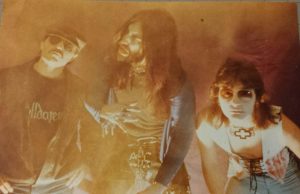
From being one of the most hated early thrash bands to one of the most cult, Italy’s BULLDOZER forged their own path throughout the ‘80s, burning the rule books along the way. From being signed to Roadrunner, almost collaborating with King Diamond and inspiring The Prodigy. GUY STRACHAN relives those days of wrath with frontman AC WILD
Before the release of ‘Reign In Blood’, thrash metal was generally treated as a bad joke by much of the mainstream media. Bathory, Voivod, Hellhammer, Sodom and even Slayer themselves received at least one vicious slaughtering from at least one major metal magazine during their tentative years, but there was one band who, perhaps more than any other, was on the receiving end of continual, indescribably harsh criticism (such as Kerrang!’s “the worst band ever”) that commenced with their debut 7″ and taking until the band’s fourth LP before they finally received some grudging respect outside of their fan base. That band was Italy’s Bulldozer who, after calling it quits as the ‘80s ended, surprisingly picked up the baton again in 2009 with the release of ‘Unexpected Fate’.
“We had several requests from fans but Andy [Panigada, guitars] and I were conscious that we could not play our instruments properly,” says vocalist/bassist AC Wild on the reformation. “However in 2007 I discovered that the ‘IX’ album was containing a kind of prophecy. I had the need to propose another message. At the same time Labyrinth invited me on stage in Japan for a couple of songs (Bulldozer and Motörhead covers). I accepted and then I realised that I was ready to come back. I called Andy and asked him to try to re-start playing guitar. After one month of hard rehearsal he realised that he was ready to come back too.”
Taking almost a year to gestate, ‘Unexpected Fate’ drew predominantly upon music written during the final year of Bulldozer’s original existence, while the lyrics themselves were written post-reformation. It’s not unusual for bands to feature special guests on their records, although Bulldozer’s choice of such for their comeback was characteristically unorthodox and eyebrow-raising.
“[Michael Jackson’s former guitarist] Jennifer [Batten] collaborated with me as a publisher of music in Japan [AC’s current career] in the ‘90s,” he says. “I really like her approach to music, any kind of music. She’s a very amazing person and an extraordinary musician and I had the lucky chance to invite her in this project. I’ve heard from Dave Lombardo that Slayer listened [to] the whole album during a flight in their private jet and they really liked her solos. Regarding Billy [Sheehan – UFO, Steve Vai], his American manager who organised clinics in Italy informed him that a ‘strange’ Italian man who published many interesting tracks in Japan and released some prestigious Classical music CDs was reforming his metal band after 18 years and proposed making a bass solo in our album to him. He was already in Milan, accepted our invitation and came to the studio. When he came I had already recorded most of the bass parts of the album (fortunately) and when I saw him improvising and playing his bass from a distance of one metre, I felt very, very ‘poor’ and limited.”
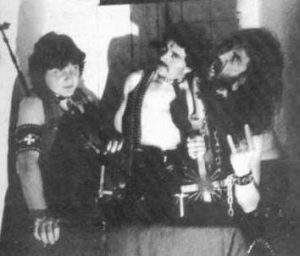 Taking a loooong step back in time, Bulldozer were frequently viewed as a Satanic band; not only because of their drawing on Venom as a key musical influence, but also because of their lyrical and visual imagery was aesthetically focused on the darker elements of life. This was and is something that AC has been at pains to admonish over the years, stating that Satanism is, for him, a type of religion and therefore no better than any other form of worship. That said, Bulldozer’s lyrics were highly anti-religious, something derived from ACs early intentions of becoming a priest.
Taking a loooong step back in time, Bulldozer were frequently viewed as a Satanic band; not only because of their drawing on Venom as a key musical influence, but also because of their lyrical and visual imagery was aesthetically focused on the darker elements of life. This was and is something that AC has been at pains to admonish over the years, stating that Satanism is, for him, a type of religion and therefore no better than any other form of worship. That said, Bulldozer’s lyrics were highly anti-religious, something derived from ACs early intentions of becoming a priest.
“When I was 16 I felt a kind of call for becoming a ‘cappuccino’ [St Francis] monk,” he recounts, “and I started going to their convent and seminary and I was honestly feeling fine with them but [it] was suggested I improve my studies by going to the Catholic University of Philosophy and Theology. At 19 I attended university for one year and I became deeply anti-religious. Of course, these experiences gave me inspiration for writing Bulldozer songs. You have to consider that, for example, the great heretic and philosopher Giordano Bruno (who was burned in 1600) had been a monk before becoming anti-religious. Also, Robespierre was a ‘cappuccino’ monk for a short period. Sometimes religious experience creates big ‘damages’ and sometimes, as in the case of Bruno, great intuitions and great ideas,” he adds.
Regrouping the band following an abortive first attempt that disbanded when founding members Dario Carria and Andy Panigada were compelled to perform National Service, the duo drafted one Alberto ‘AC Wild’ Contini into the band as a singer who, alongside drummer Erminio Galli, completed the line-up. Following the self-released ‘Fallen Angel’ 7” single in 1984, the band headed back into the studio to record a demo tape (recently released as ‘The Exorcism’ by F.O.A.D. Says AC: “They asked me if we had the very first Bulldozer demo. I found a copy in a dusty box in the basement of my house and checked it. The sound was still there, so I gave it to them, together with old photos. I think Algy [Ward]’s production sounds much better but I like also the first version.”). Just three copies of that tape were circulated; one of which was sent to leading label Roadrunner (and securing them a deal). Taking a grand shot in the dark, the recording was forwarded to a fellow Roadrunner signatory, with a request for him to take the producer’s chair for their debut album. The recipient of the tape, one King Diamond, turned down that request, stating that Bulldozer’s material was “too punk” for him, and instead Roadrunner procured the services of Algy who, after parting ways with The Damned formed Tank, a band much enamoured by most of Bulldozer. Both Carria and Galli were to leave Bulldozer shortly before the contract with Roadrunner was signed, following parental pressure to quit; former criminal Don Arras was recruited as a bass player. Upon discovering Arras could also beat the crap out of a drum kit, AC Wild added bass to his vocal duties and Bulldozer the trio was born.
“Dario and I were big fans of Algy,” says AC of the producer. “Andy instead was a big fan of Mercyful Fate, much more than Tank [and] since he was the main composer and musician of the band I accepted his wish to invite King Diamond but, as you know, he did not accept. I confirm again that I really appreciated what Algy did. I also,” he adds, alluding to Ward’s reputed familiarity with the pleasures of hard living, “confirm that he really loved our Vino Rosso, drank lots of bottles and one day he visited the studio toilet ‘several’ times. In the end I want to add that he is a great man! I hope to see him again in the future.”
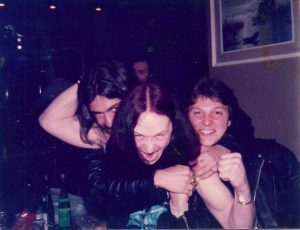 The debut album, ‘The Day Of Wrath’ was well-received by fans of the thrash underground, and slaughtered pretty mercilessly by reviewers in the media, as every great album of the day invariably was. ‘Venom clones’ was the accusation most frequently slung at the trio, something that their label did little to dispel; it was, allegedly, that marketing ploy that aided the band in securing their spot on the ‘Speed Kills’ compilation. Despite such ignomus events, the healthy underground success of the album (including prized licensing deals for America and Japan), led to Roadrunner picking up an option for a second album. ‘The Final Separation’ continued in the same vein, although the band’s attempt at aiming for something both darker and more serious was stymied by a relatively poor production that gave the sophomore album a weaker and less forceful sound than the debut. A poor press reaction inevitably followed, although today the album is seen in a much more sympathetic light.
The debut album, ‘The Day Of Wrath’ was well-received by fans of the thrash underground, and slaughtered pretty mercilessly by reviewers in the media, as every great album of the day invariably was. ‘Venom clones’ was the accusation most frequently slung at the trio, something that their label did little to dispel; it was, allegedly, that marketing ploy that aided the band in securing their spot on the ‘Speed Kills’ compilation. Despite such ignomus events, the healthy underground success of the album (including prized licensing deals for America and Japan), led to Roadrunner picking up an option for a second album. ‘The Final Separation’ continued in the same vein, although the band’s attempt at aiming for something both darker and more serious was stymied by a relatively poor production that gave the sophomore album a weaker and less forceful sound than the debut. A poor press reaction inevitably followed, although today the album is seen in a much more sympathetic light.
“Fans like the album now probably because of the song quality, even though it sounds like a demo,” AC opines. “Now, many fans like old demos and I think that they like ‘The Final Separation’ for the same reason. Sometimes old demos have [a] special atmosphere; sometimes you feel the spirit of that great period.”
Bulldozer’s relationship with their record label was tenuous at best; from the band side they found their proposed artwork rejected, truncated or replaced without any further recourse and being marketed as nothing more than Venom clones (to the point where they jokingly asked for royalties), while from the label’s side the band were probably not as ‘professional’ (i.e. conformist) as they would have liked. With the press reviews for ‘…Separation’ leading to the loss of the licensing deals and disappointing sales, it was inevitable that the band and Roadrunner would part ways.
“Of course, Roadrunner was a very professional and successful record company,” says AC. “Their obvious goal was to sell as much as possible. At that time, and to this day, Bulldozer’s goal was to propose our ideas integrally, disregarding totally the market requests. We were heretics and sometimes kind of ‘extreme metal Talibans’. If you want to collaborate seriously with a record label you must follow their suggestions, but we did not, and we were treated like heretics. I wanted to go that way. I still do my Bulldozer activity with this mentality; I prefer to create new and maybe strange ideas instead of having success.”
AC expands on this theme, pointing out that the band had few thoughts of success and worked day jobs throughout their career. Alongside a desire to do things their own way, matters were not helped by the band being unable to tour; AC Wild was denied a passport until 1987 thanks to his consciously objecting to performing military service and as a result any touring had to be constrained to Italy.
“Of course with Bulldozer we did not get money, with the exception of [1992 EP] ‘Dance Got Sick’. All of us had his own job. My job is a music publisher in Japan. Nowadays with the music business crisis it’s not a great job, but I can get enough to feed my kids. After the years of ‘Dance Got Sick’ I also produced some classical albums and produced an experimental album, with improvisations on Vivaldi’s melodies, performed also by Dave Lombardo.”
Despite having a deal with Roadrunner, being one of the most extreme bands in the country meant that Bulldozer found it extremely difficult to get gigs, outside of small, underground affairs. The live situation was only resolved (in Italy at least) when, after leaving Roadrunner, the band signed to Metalmagic, a subsidiary of Discomagic that was one of Italy’s biggest independent labels at the time. The success of the parent company meant the prospect of a professional company with good distribution who also licensed acts such as Helloween for the local market. The band’s Italian sales thus improved, although the exporting of heavy metal records outside of the domestic market proved to be more problematic for the label. Such were the reviews that the band’s third album, ‘IX: Circle Of Hell’ received, however, it was a surprise the record made any sort of showing anywhere. Missing the violence of the music and the heavy doses of irony completely, the band were accused of being hate-mongering sexists by the press, which didn’t exactly do their international standing much good, although it has gone on to be a far more influential than might be thought.
“This album was well accepted at that time only in Italy, Poland and partially in Japan. It influenced bands like Vader and Behemoth in Poland and bands like Abigail, Sabbath, Terror Squad and Clandestined in Japan. In the north of Europe, mainly in the UK and Germany it was treated like pure heresy and the reaction in general was very limited: only few fans liked it in these countries. Of course we were not happy for that, but, if you behave like a heretic you can’t expect success!”
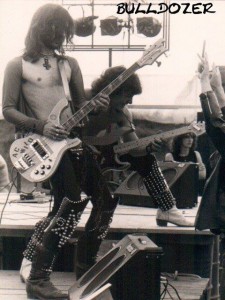 The follow-up, ‘Neurodeliri’ [1988], finally found Bulldozer receiving recognition outside of their fan base, but the band were finding themselves bereft of suitable ideas and so decided to quit while they were ahead. Aware of a fan base in then-communist Poland, the band went behind the Iron Curtain to play a huge show that was recorded and released as ‘Alive In Poland’ in 1989. By 1990, the band was no more.
The follow-up, ‘Neurodeliri’ [1988], finally found Bulldozer receiving recognition outside of their fan base, but the band were finding themselves bereft of suitable ideas and so decided to quit while they were ahead. Aware of a fan base in then-communist Poland, the band went behind the Iron Curtain to play a huge show that was recorded and released as ‘Alive In Poland’ in 1989. By 1990, the band was no more.
“The reaction to ‘Neurodeliri’ was great in Italy and Poland, good in Japan and very limited in the rest of the world. In the UK, Metal Forces magazine, as well as Aardshock in Holland made ‘respectful’ reviews and that’s what I remember. When I realised in 1989 that Bulldozer had a great following in Poland I was very satisfied and surprised. It did not mean money for us (as Poland was very poor at that time), but I was glad that in some parts of the world our ideas were appreciated. [The] ‘Alive In Poland’ show was one of the very best experiences with Bulldozer. We decided to quit in 1990 mainly because we had no important ideas to propose at that time. The lack of international success was ‘business as usual’ for us and was not the cause of our retirement.”
Fame and fortune are strange phenomena. Many have devoted entire lives to their pursuit, with disappointment and resentment being realised far more often than what is sought. At the same time, success can strike anywhere and at any time, and often in the least-expected circumstances. In Bulldozer’s case, it was the EP, ‘Dance Got Sick’, which brought the band rewards that had hitherto eluded them. Quickly recorded and then released as a ‘from-the-grave’ ironical piss-take of the metal scene in 1992, Japan fell for the techno-driven approach in a big way. Far, far more than any of Bulldozer’s existing fan base did, at any rate.
“I consider it the greatest heresy of Bulldozer,” says AC. “Most of our traditional fans hated that project and the CD sales were very poor. Only one year later, an English DJ working at Juliana’s in Tokyo [then the best-known discotheque in Japan] listened to ‘Part 3’ from a 12” record and decided to play it one night. The reaction was very positive. That part was then licensed by Avex, the biggest record company in Japan, and sold a lot; for the first time ever Bulldozer sold very well! It was really unexpected. Andy was asked to produce new tracks like that and he did several productions with the collaboration of Dr Dope [the US rapper from Brooklyn]. I just published these following songs. One of the tracks was very violent and aggressive with a lot of electric guitar and outrageous lyrics [and] became a big hit in Japan. Avex invited Dr Dope to perform it at AVEX Rave festival at Tokyo Dome, 1994, in front of 50,000 people. I decided to organise a live performance with Jennifer Batten on guitar, Helder Stefanini (ex-Raw Power) on drums, Dr Dope on vocals and me playing bass. We were the only artist playing live and [we played] very aggressively. The Prodigy were there too, and after that their music became much, much more aggressive. Honestly I’m not so proud of that but I still think that it was an interesting idea.”
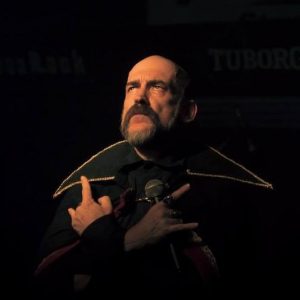 Since the reformation, the Bulldozer release schedule has been filled with several releases. Included in this list is their first DVD, the documenting of another visit to Poland 22 years after the first and, as well as an insanely limited vinyl issue of one of the original incarnation’s last shows, ‘Last Live Legend’ produced in Japan with a pressing of just 135 copies. Each of these releases were spontaneous in that the recordings of the shows concerned was not planned before the event, but AC is happy with the results, feeling especially that the DVD captures a full 100 percent of the band’s live impact.
Since the reformation, the Bulldozer release schedule has been filled with several releases. Included in this list is their first DVD, the documenting of another visit to Poland 22 years after the first and, as well as an insanely limited vinyl issue of one of the original incarnation’s last shows, ‘Last Live Legend’ produced in Japan with a pressing of just 135 copies. Each of these releases were spontaneous in that the recordings of the shows concerned was not planned before the event, but AC is happy with the results, feeling especially that the DVD captures a full 100 percent of the band’s live impact.
“You are right!” he responds when asked if the collection of live recordings were a collection of singularly unique shows. “We had the chance to record our show in Germany at the RHF 2010 on multi-track. We mixed it and released it only through digital stores, while 4 songs were used for the re-release of ‘Unexpected Fate’ by Scarlet Records. When we toured in Poland in 2011 we recorded the Warsaw show but ‘bootleg’-style with a stereo video recorder. The promoter asked us if he could release that recording and we accepted. It’s an ‘official bootleg’. In 2012 we played at RHF in Italy, near Milan, in a great venue with a great audience, PA and lights. The same day of the show we had been asked if we were interested to record the show in multi-track audio, while a small troupe of cameramen offered us to record the show from four different video cameras. We accepted, paid them their honest fee in advance and played our show. The show was good for us, the images were good enough too and so we decided to produce a live DVD, the first of our career. I can say that any of our recent live recordings were not planned before. I think we improved our live performance in these years and the last DVD, ‘The Neurospirit Lives At RHF’ represents our live impact 100 percent.”
Will the band be heading back into the studio? Well, a new studio album is planned, with a release date of late 2014 pencilled in, but that’s as far as any information concerning the planned venture goes. As AC says, “We are seriously working on a future studio album. We are taking a lot of time but I hope we’ll be able to release it within one year. We might invite some special guests, although not those on ‘Unexpected Fate’.”
Having achieved so much, do you have any hopes or ambitions left?
“I have no ambitions but purposes,” he replies, “to propose interesting ideas. The only thing I hope is having a brain in a condition to be creative in the future.”
(Originally printed in Iron Fist #8 available here)
Copyright © 2024 Iron Fist Magazine. All Rights Reserved.